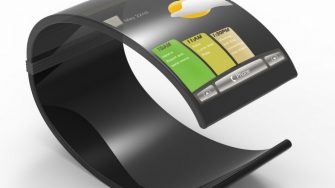
Flexible and mechanically-stretchable electronics are crucial to a wide range of emerging technologies, such as wearable medical devices, electronic skin, and soft robots. These applications demand the sensors and electrical interconnects to withstand large mechanical deformation without failure while retaining their electrical sensing or conduction properties. These properties significantly extend beyond traditional metals and silicon-based semiconductors.
Our researchers design and develop stretchable conductive nanocomposites of exceptional stretchability and electrical properties, which have the potential to transform a wide range of applications. These applications include wearable sensors for biophysical and biochemical markers, stretchable conductors and electrodes, and deformable energy harvesting and storage devices.
Wearable sensors for biophysical and biochemical markers
Wearable sensors are becoming increasingly popular in healthcare and wellness applications due to their ability to continuously monitor biophysical and biochemical markers. These sensors are typically worn on the body and can track a wide range of physiological signals, such as heart rate, blood pressure, and body temperature, as well as biochemical markers such as glucose, lactate, and cortisol levels. To detect and monitor these crucial biosignals that relate to individual health conditions, we are developing novel nanocomposites that are stretchable, conductive, and possess unique microstructures and electromechanical response.
Stretchable conductors and electrodes
Stretchable conductors and electrodes are materials that can be stretched or deformed without losing their electrical conductivity. They are used in a wide range of applications, including wearable electronics, flexible displays, and biomedical devices. One of the key challenges in developing stretchable conductors and electrodes is finding materials that can withstand repeated stretching without breaking or losing their conductivity. Our research interest is focused on developing new soft conductive nanocomposite materials and microstructure design to improve the performance and durability of stretchable conductors and electrodes.
Deformable energy harvesting and storage devices
Deformable energy harvesting and storage devices are becoming increasingly relevant in the field of wearable electronics due to their ability to harvest energy from human motion and store it for later use. These devices can be deformed or stretched without compromising their performance, allowing them to be incorporated into clothing or other flexible substrates. Supercapacitors are particularly well-suited for use in wearable devices because they can be charged and discharged quickly, providing a rapid energy boost when needed. They can also be deformed or stretched without losing their performance. Our research is focused on developing soft and stretchable energy harvesting and storage devices and integrating then with other wearable electronics.




